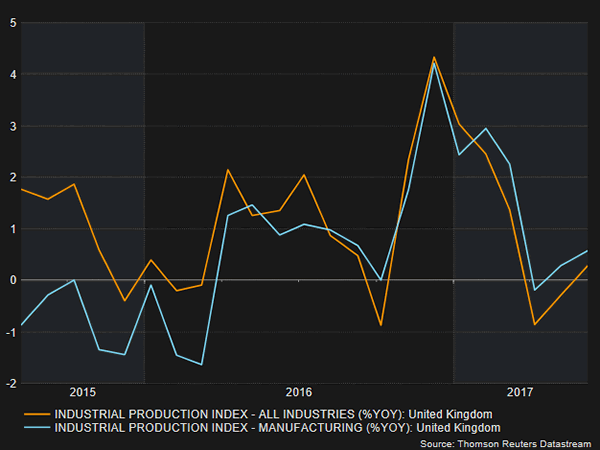While the BOE is hoping for exports and investments to rebalance the slowdown in consumption, as MPC member Michael Sanders expressed a month ago, data released on Thursday showed the goods trade deficit widening and reaching the highest level since September. On the other hand, industrial output showed improvement, but the improvement was seen as temporary. As a response, sterling picked up from a three-week low it touched prior the data.
According to the Office for National Statistics, British industrial output expanded unexpectedly in June as oil companies postponed seasonal maintenance. Industrial production recovered from a 0.1% contraction in May, expanding by 0.5% month-on-month and exceeding the forecast of 0.1% growth. Year-on-year the change was positive at 0.3%, while analysts expected the figure to rise from a negative 0.2% to a negative 0.1%. However, the improvement in the data was mainly due to a postponing in oilfield maintenance which is likely to take place later in the year.
Looking at the industrial sectors, the output in the manufacturing sector showed no growth in June as expected, following a decline of 0.1% in May (upwardly revised from 0.2%). A reason for this was attributed to a sharp fall in car production which amounted to 3.6% (steepest fall since December 2013) versus a drop of 2.3% in May. On a yearly basis manufacturing output growth doubled in June, in line with forecasts, from 0.3% to 0.6%.
Construction activities, which represent 6% of the economy, also contracted during the month, falling surprisingly by 0.1% compared to a 0.4% downturn in the previous month. Analysts anticipated instead a 1.5% improvement in construction output. The yearly equivalent increased from 0.5% to 0.9%, missing the forecast of 1.9%.

In the other important report of the day, trade data came in worse than expected. Goods trade deficit widened from £11.31 billion to £12.72 billion, whilst analysts expected the trade deficit to narrow to £11 billion. This was the biggest trade deficit since September. Regarding Non-EU trade balance, the deficit rose by almost £1 billion to £4.47 billion, above the £3 billion expected.
Including exports in services, the trade deficit rose to £4.6 billion, the highest record since September. This brought doubts on whether British exporters have really benefitted since the Brexit vote from the depreciated pound (18%).
In the forex markets, sterling reacted positively after the release of the data with sterling/dollar finding support from better- than- expected industrial output growth. Sterling/dollar jumped by 0.30% slightly above the 1.30 handle before it slipped back to 1.2992. Before the data, the pound was hovering around a three-week low of 1.2950 reached today.
